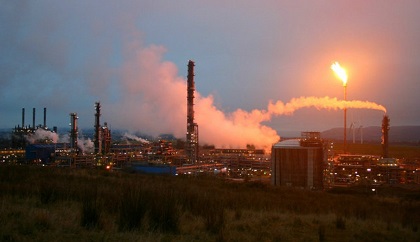
New data has revealed the environmental impact of flaring incident at the Mossmorran ethylene plant in Fife.
According to the Scottish Greens, up to 13,800 tonnes of CO2 could have been emitted from the plant during its last period of flaring in October.
Mark Ruskell MSP claims this is the same level as 9,140 return flights from Glasgow to New York - and would take 13,800 trees up to 100 years to offset it.
The party obtained the data from the Scottish Environment Protection Agency (Sepa).
Mr Ruskell said: "Flaring is distressing and highly disruptive for local residents every time this fossil fuel relic suffers a breakdown, but these figures also now show the catastrophic long-term impacts this is having on our environment.
"Scotland has a legally binding target to achieve net-zero emissions by 2045, so it’s baffling to find out this much carbon is regularly being burned off into our atmosphere with very little consequence for the operators.
"Work is planned to reduce the impacts of flaring, but it’s already been delayed, and as far as I understand, it won’t have a significant impact on reducing carbon emissions.
"The operations of this plant fundamentally rely on the burning of huge quantities of fossil fuels, and we urgently need a plan to decarbonise it, or transition away from fossil fuel industries altogether in Scotland."
Chris Dailly, head of environmental performance at Sepa, said: "As one of the organisations regulating Mossmorran, we're clear that compliance with Scotland's environmental laws is non-negotiable.
"Whilst we know limited, controlled flaring is an authorised safety feature of industrial sites and our network of air quality monitors continue to demonstrate no breaches of UK air quality standards, we know only too well the broader impacts on local communities.
"That's why in May we submitted a report in relation to Easter 2019 flaring at the Mossmorran complex to the Crown Office and Procurator Fiscal Service for consideration of prosecution, and why we are requiring the installation of noise reducing flare tips followed by the installation of ground flares.
"ExxonMobil Chemical must take steps to make flaring the exception rather than routine and reduce the impacts when the site does flare and if they don't, Sepa won't hesitate to take further action to ensure they do so."
A spokesperson for ExxonMobil said: "Fife ethylene plant is committed to minimising CO2 emissions and maximising energy efficiency. It is also important to understand that we report and pay for our CO2 emissions under the EU emissions trading scheme, which provides us with added incentive to minimise emissions.
"We have a number of innovations in heat integration, such as using waste heat from our gas turbine to reduce fuel consumption in our furnaces to maximise energy efficiency while cutting energy use and associated CO2 emissions.
"ExxonMobil is pursuing technologies to enhance existing operations and develop alternative energies with a lower carbon intensity including: researching breakthroughs that make carbon capture and storage technology more economic for power generation and industrial applications, developing process intensification technologies to reduce the energy needs of manufacturing facilities like FEP and progressing advanced biofuels for commercial transport and petrochemicals."


 10°C
10°C
 10°C
10°C
 9°C
9°C